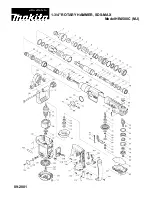
5
Safety warnings for
Drills and Hammer Drills
• Choose the right bit for the work piece.
It reduces the risk of severe injury and makes the job easier.
• To drill concrete or stone, use bits specifically designed
for concrete.
• To work on metal or plastic, use bits suitable for metal. Sizes
encompass a minimum of 0.03” (0.047” for a 0.5” chuck) and
up to the chuck maximum capacity.
• On wood, use regular bits suitable for wood. In any case,
to drill 0.25” or smaller orifices, use bits designed to drill
on metal.
• Do not try using bits exceeding the chuck capacity.
Choose the right bit
• Before starting to work with the hammer drill, take a few
minutes to assess the job to be done and double-check all
the safety caution rules.
• Fit the bit into the chuck. Remove the
chuck wrench before drilling. Failure to follow this
instruction shoots out the chuck wrench with great speed
and cause severe injury.
• Before drilling walls, floors or ceiling,
look for any built-in objects, like power cables and
conductors or pipes.
• Verify the switch is in the OFF position
before connecting the hammer drill. Otherwise, it can
unexpectedly start operating and could cause sever
injuries.
• Turn off and disconnect the tool before
reversing the chuck’s direction as well as fitting or replacing
bits.
Before using the hammer drill
CAUTION
CAUTION
WARNING
DANGER
DANGER
•
Use the auxiliary handles, if supplied with the tool.
Loss of control may result in personal injury.
•
Hold the tool by the isolated parts. The cutting part of
bit could come into contact with hidden wiring or
with its own power cord.
Making contact with a
power cord causes the tool metal parts get electrified and
may result in electric shock to the user.
• Do not force the tool to excessive workloads.
• Turn off the hammer drill immediately
if the bit gets stuck into de work piece. Then, remove the
bit off the work piece. Do not try removing stuck bits
turning on and off the tool.
• Do not apply too much force on the tool in order to
accelerate the drilling procedure. The bit could get
damaged and the tool would loose efficiency and useful
life.
• A large diameter bit causes a higher
reactive force leading to losing control over the tool. To
avoid this possibility, firmly hold the tool with both hands
and keep balanced footing. Drill at 90°
• Be prepared to relax the drilling force when the bit goes
through the material. Sudden movements could break the
bit or damage the hammer drill.
• Do not touch the bit or the orifices
immediately after drilling. Wait until they cool down to
handle them. Do not try to cool them down using water
or oil.
• Immediately after using do not set the tool where there
are particles and / or dust. They can be absorbed into
the tool mechanism and cause damage.
• Use earplugs when the noise is higher than 85 dB
Exposure to noise can cause hearing loss.
• Use dust mask and dust extractor if necessary.
Remember that materials such as asbestos, paint with
lead, additives, some types of wood, metals or minerals
are highly toxic.
• Use safety glasses.
While operating the hammer drill
CAUTION
CAUTION
WARNING
ENGLISH
Summary of Contents for ROEL-50N2
Page 10: ...Notas 10 ESPA OL...
Page 22: ...ENGLISH Notes 10...






































